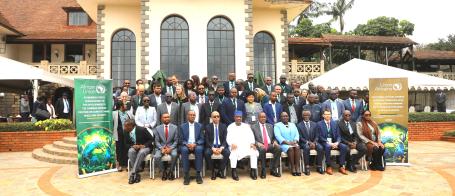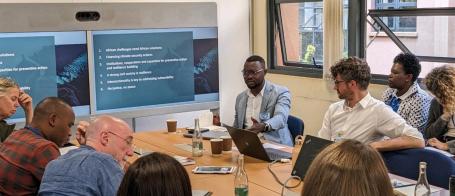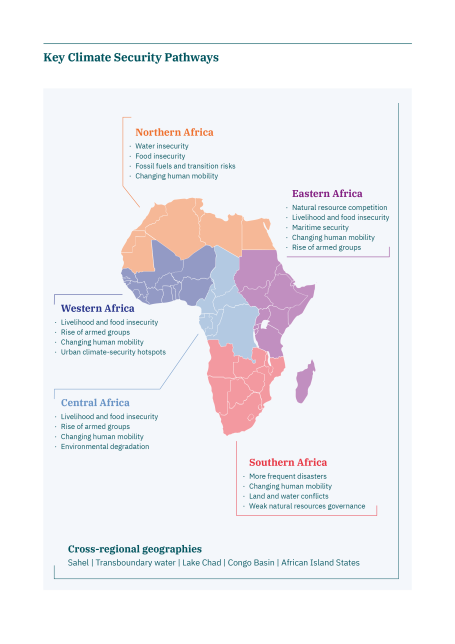Weathering Risk builds the evidence base for the Common African Position on Climate, Peace and Security

The Africa Climate Security Risk Assessment (ACRA) is the first comprehensive study of climate, peace and security across Africa. It was led by the African Union Commission, implemented by adelphi together with co-authors from various regional governmental and non-governmental organisations from across the continent and endorsed by the African Union Peace and Security Council. The assessment provides contextually specific analysis of climate impacts, political and socioeconomic challenges, and climate-related security risks across Africa to inform continental and regional policymaking and the evidence base for the first Common African Position on Climate, Peace and Security. This common position is the first continental collective stance on the nexus, solidifying African action and potentially benefitting millions of Africans on the frontlines of climate change and conflict.
Innovative yet fragmented climate, peace and security efforts
Despite experiencing the worst impacts of climate change that exacerbate existing political, socioeconomic and security challenges, African efforts to address climate security are on the rise. However, these efforts have often been fragmented and noncomplimentary, creating a need for a unified and comprehensive stance across the continent.

Tendai Kasinganeti (AU-PAPS) and Lukas Rüttinger (adelphi) presenting the findings of ACRA. 30 August 2024, Nairobi, Kenya.
Establishing the evidence: Climate security in Africa
To enhance coordination and streamline efforts, the African Union Peace and Security Council (AU-PSC) called for a comprehensive study on Climate, Peace, and Security (CPS) across the continent. In support of this pioneering undertaking, adelphi, through its Weathering Risk initiative, was chosen to be the implementing partner of this study and worked in tandem with the African Union (DPAPS and DARBE) to produce the Africa Climate Security Risk Assessment (ACRA). The development process of ACRA was inclusive and iterative and included consultations with AU institutions, Regional Economic Communities/Regional Mechanisms (RECs/RMs), and regional and national experts from the Continent. The assessment was, then, validated by AU member states through multiple rounds of consultations to ensure consensus, contextual accuracy and precision. This inclusive process was essential to build African consensus towards the common African position.
Based on this analytical process, ACRA establishes the evidence basis for ensuing policy processes and provides factual representation of climate-related (human) security risk pathways across the 5 regions of the African Union. Each regional chapter was co-authored by regional subject-matter experts, ensuring that it was contextually sensitive and relevant. Trans-regional geographies are also addressed within the framework of ACRA.

Resulting processes and impact
Based on the state-of-the-art knowledge and input provided in ACRA, an important process was made possible:
- The findings of ACRA informed the AU Chairperson’s Report on Climate, Peace and Security by H.E Moussa Faki. This elevates the importance of the topic within the African Union and concludes with the recommendation to develop and adopt a Common African Position on Climate Change, Peace and Security (CAP-CPS) that was reaffirmed by the AU-PSC October 2024 communiqué.
- The CAP-CPS unifies African voices on climate, peace and security issues in multilateral processes and solidifies the role of African negotiators (including the African Group of Negotiators) in climate negotiations. This will enhance continental and institutional collaboration on the climate and security fronts through an informed framework and allow African nations to speak with one voice in bilateral and multilateral processes including COP, United Nations General Assembly and United Nations Security Council. The CAP aims to foster collaboration and coordination across the continent to address local conflicts and vulnerabilities in relation to increasing climate impacts. This policy tool is crucial to advance the priorities and interests of African nations, with foreseen tangible benefits on the populations of Africa in terms of increased conflict-sensitive and climate-responsive policy and programming, improved climate finance schemes and environmental peacebuilding action.
- The recommendations of ACRA also provide a good basis for addressing climate-related security risks for the AU and beyond.
The Common African Position on Climate Change, Peace, and Security will empower member states to tackle [these] challenges, improve early warning systems, and build a unified voice in international engagements.
Statement by Dr Alhaji Sarjoh Bah, Director, Conflict Management Directorate, Political Affairs, Peace and Security, AUC at the member state consultations on the development of the Common African Position on Climate Change, Peace and Security
27 August 2024, Nairobi, Kenya
This impact story was prepared by Yosr Khèdr (adelphi) and reviewed by Alexandra Steinkraus (adelphi) and Lukas Rüttinger (adelphi)
Share on

